The United Golden Exchange Awards released the market confidence survey of the equity investment industry under the epidemic situation
Conquering the epidemic situation, confidence is more precious than gold! Crises are often opportunities for new developments. Historically, every crisis is a major opportunity for technological, social, and commercial changes.
In order to understand the impact of the new coronavirus epidemic on the equity investment industry, the Jinhui Award conducted a special questionnaire survey.
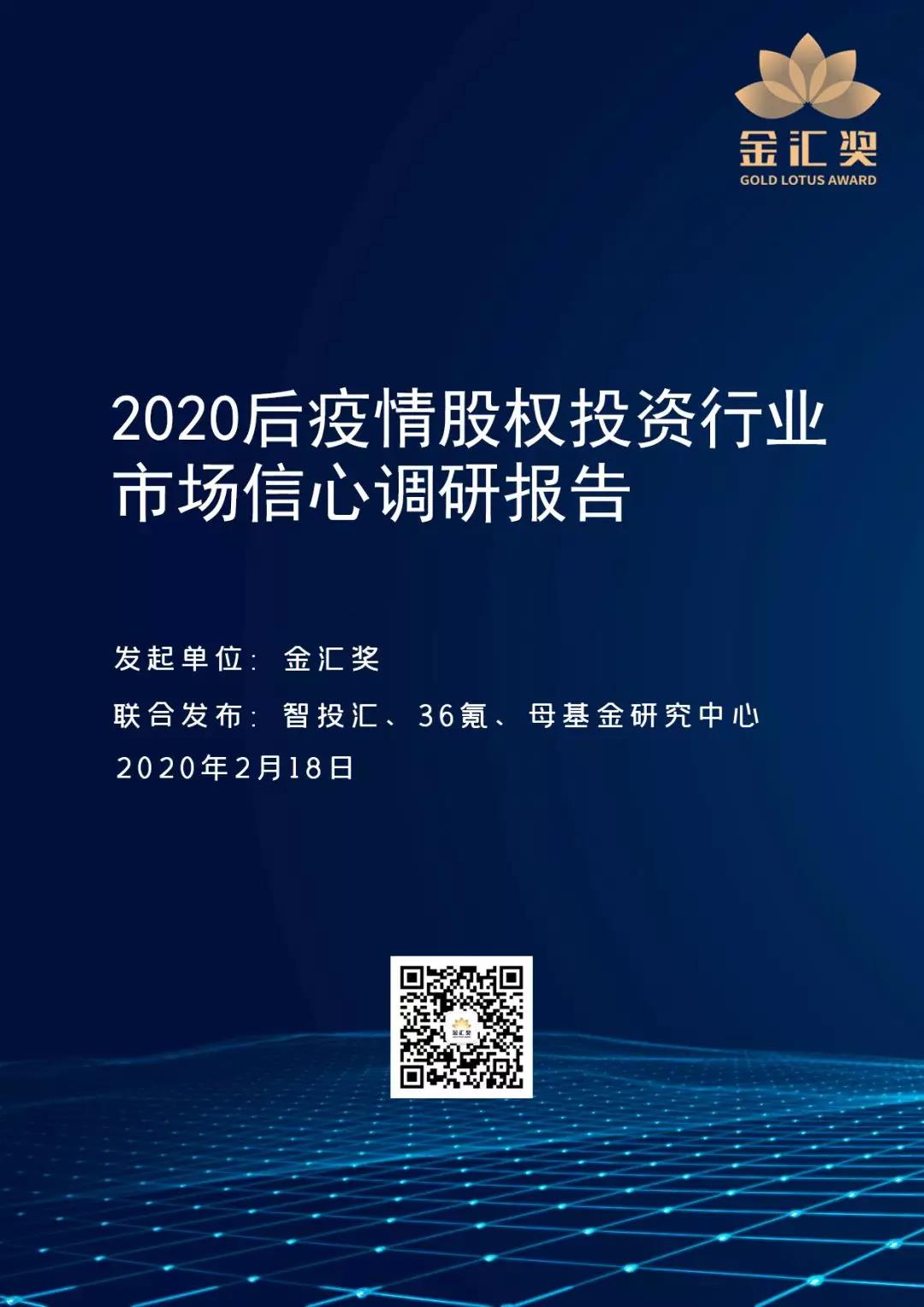
I. Survey Introduction
The investigation of the Jinhui Awards, from questionnaire production to questionnaire processing to questionnaire processing, took nearly a week. During the period, it won, the Fund Research Center, People’s Venture Capital, Anhui Private Equity Association and the investment formed in cooperation with the Jinhui Awards. Support from institutional and individual investors. Through a pair of certain directions, as of February 7, 2020, 104 valid questionnaires have been recovered. Among them, 48 in Beijing, 18 in Shanghai, 12 in Shenzhen, 5 in Hefei, 4 in Fuzhou, 2 in Shijiazhuang, 2 in Hong Kong, 2 in Suzhou, 2 in Xi’an, 2 in Chengdu, Zhengzhou, Changchun, Guangzhou, Ningbo, Yancheng , Nanjing, Qingdao, one each, the categories of the participating research institutions are listed in Table 1:
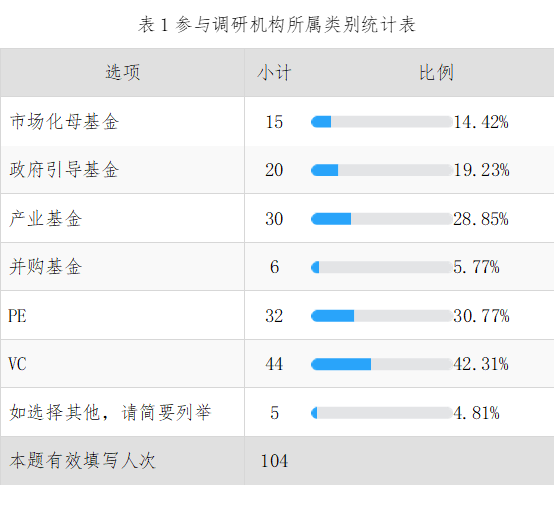
Note: This question is a multiple choice question in the survey questionnaire, so the proportion of the question is not 100% (the same below)
Through survey data, from the perspective of the scale of funds available to the institutions, the surveyed institutions currently have sufficient reserve funds available for investment and have the basis for post-epidemic investment. As shown in Figure 1 below, more than 85% of the institutions have available investment funds of more than 50 million; the number of investment institutions with available funds of more than 500 million accounts for 50.96%.
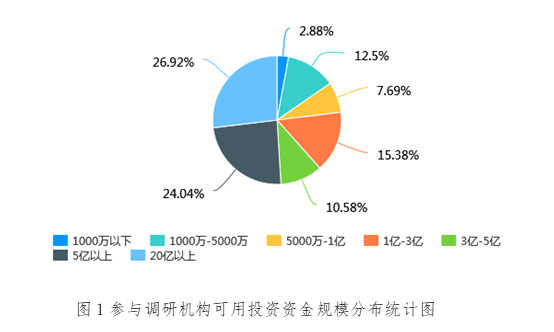
Second, survey results and analysis
Through research, generally speaking, under the influence of the new crown pneumonia epidemic, most investment institutions are still optimistic about the sustainable and healthy development of China’s equity investment market. The agency believes that the difficulties are only temporary and phased, mainly because the equity investment industry has a long continuous cycle, so the impact is relatively small. In addition, some investment institutions can use their own expertise and past accumulated resources to quickly adjust investment strategies based on market changes, turn crisis into opportunity, and seek better development opportunities. The specific research content is as follows:
From the impact of the epidemic on institutional business, Only 9.62% of institutions stated that they have not formulated effective response measures, and the epidemic has a great impact on their business; more than 50% of the institutions believe that the epidemic has caused business development The impact is small, mainly because some businesses can use online office to effectively reduce the impact. The specific data is shown in Figure 2:
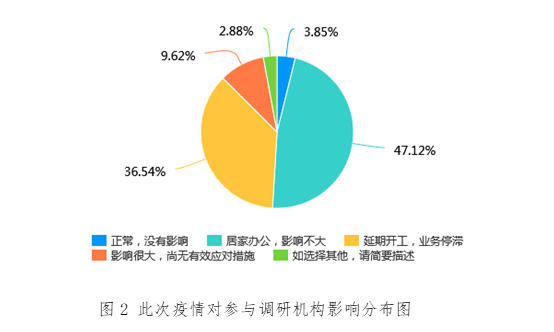
Why so many institutions have not been affected by the epidemic. We have conducted surveys and data from 2020.01 to February. From the data of investment amount and investment amount, funds are still concentrated in technology, finance, consumption, culture, and entertainment. Industries such as medical, health care and high-end manufacturing are quite different from offline industries such as catering and cinema consumption that have been severely affected by the epidemic. From the perspective of investment institutions such as Tencent, Sequoia Capital, and Jingwei Venture Capital, which focus on corporate services, health care, artificial intelligence, and technology-driven industries, the outbreak of the epidemic is for these deep-dividing vertical segments and institutions that are committed to long-term investment. The impact is limited. Regardless of objective data or industry observation, the industries in which equity investment institutions are focusing on have been affected in this epidemic, but the impact is relatively small.
The coming and ending time of the inflection point of this epidemic has been the focus of attention of all subjects in the society. Although there is no clear estimate yet, from the surveys of various institutions, , more than half of the institutions believe that the impact of the epidemic will continue for a quarter; more than 86% of the institutions believe that the epidemic The impact continues for less than half a year. The specific situation is as shown in Figure 3:
From the perspective of fundraising, although most of the institutions surveyed have sufficient investment funds, the fundraising plan for 2020 has not been suspended. It is only affected by the epidemic that has raised the difficulty of fundraising in the short term or needs to adjust the fundraising plan and strategy according to the impact of the epidemic. According to surveys, 75.96% of investment institutions’ existing fundraising plans have been affected, and 65.38% of investment institutions find it more difficult to raise funds. In this case, most institutions still choose to build a diversified fund-raising structure, such as government-guided funds, market-based parent funds, corporate investors, and so on. :
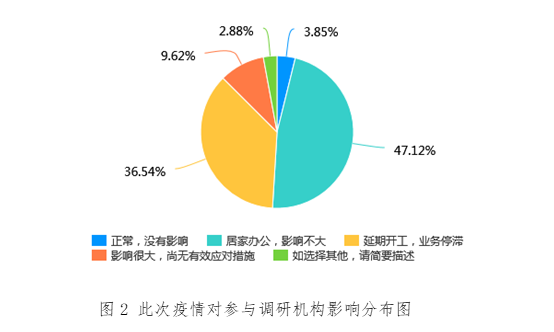
Since the epidemic situation has caused a periodical negative impact on China ’s real economy, although it will not change the fundamentals of the long-term positive of the Chinese economy, it may exacerbate the difficulty of raising funds in China ’s equity investment market in the short term. For LP, due to the impact of the epidemic, individual investors, listed companies, and other non-listed companies are mainly used to maintain the normal operation of the enterprise, and the pace of capital investment is bound to slow down; and government guidance funds and government funding platforms are The state-owned LPs represented by them are greatly affected by administrative management and fiscal budgets, and their investment activity will also decrease compared to the past.
For investment institutions, the operation of fund-raising related tasks will also become more difficult. Foreign currency fundraising Due to temporary national entry bans issued by some governments and the uncertainty of foreign LPs on the future development of the Chinese economy, the difficulty of fundraising has further increased; some of the work such as on-site adjustments and offline interviews cannot be completely replaced by online work, so It will also adversely affect the short-term fund-raising activities of investment institutions.
From the perspective of investment, TMT, biotechnology / medical health, artificial intelligence, and intelligent manufacturing are also popular directions that capital is focusing on. The specific situation is shown in Table 3:
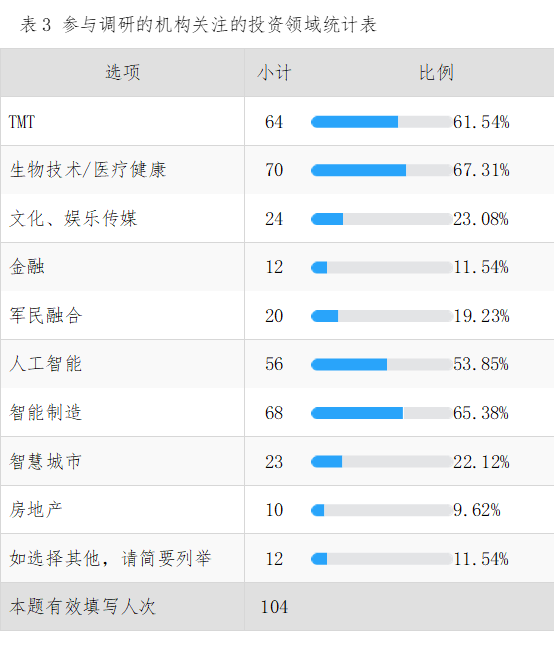
From the perspective of investment strategies, affected by the epidemic, nearly half of the institutions ’investment strategies are affected:
More emphasis on cyclical factors. On the one hand, the investment time should be dispersed, so that the team goes through a complete investment cycle. The diversification of investment time means that the investment is not concentrated in a certain year. In order to avoid emergencies such as “black swan” and “gray rhino”, some investment institutions will have a clear investment cycle and exit cycle, a clear investment strategy and execution procedures. For example, equity parent funds usually set a 3-year investment period The purpose is to reduce the adverse effects of the cycle. This epidemic is a sudden and major event, and some are in danger. After the epidemic, some institutions with sufficient funds will quickly find investment opportunities in the new situation and expand their distribution.
The team is paying more attention to whether they have gone through the full cycle. In general, the operating cycle of an equity investment fund is 8-10 years. If the team goes through a complete cycle and can turn past failures into successes, the stronger the awareness of risk prevention.
More emphasis on overseas asset allocation . Although the epidemic has greatly affected the domestic catering, retail, tourism, film, offline training and other industries, due to the correlation between industries, it will eventually be transmitted to other industries, which will have an impact on the entire Chinese economy. . If the investment layout is all domestic, it will be dragged down in general, especially the investees in Wuhan, Hubei, where the epidemic is more serious. However, if some assets are deployed overseas, the impact of these assets will be limited.
The crisis is dangerous on one side and opportunity on the other. Every crisis breeds new companies. For example, during the SARS period in 2003, some online shopping, education, and tourism companies summarized their experiences during the crisis, actively developed products that adapted to market needs and implemented transformation, quickly occupied the market after the epidemic, and stood out from the competition. In the context of the new crown pneumonia epidemic, more than half of the surveyed institutions believe that there will definitely be new investment opportunities and vents, as shown in Table 4 below:
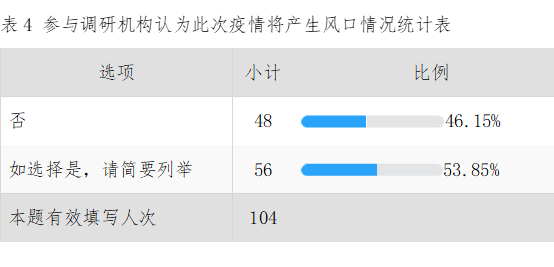
The epidemic of new crown pneumonia has changed the consumption habits of residents in stages, bringing development opportunities for many TMT innovative companies focusing on online business. In particular, the growing demand for telecommuting has helped the development of a wave of industry-related companies.
According to data from the Institute of Foresight Industry, as of 2017, more than 80% of companies in the United States have introduced a remote working system, and 30 million people have been working remotely from home, accounting for 16% -19% of the working population in the United States. Data Display,